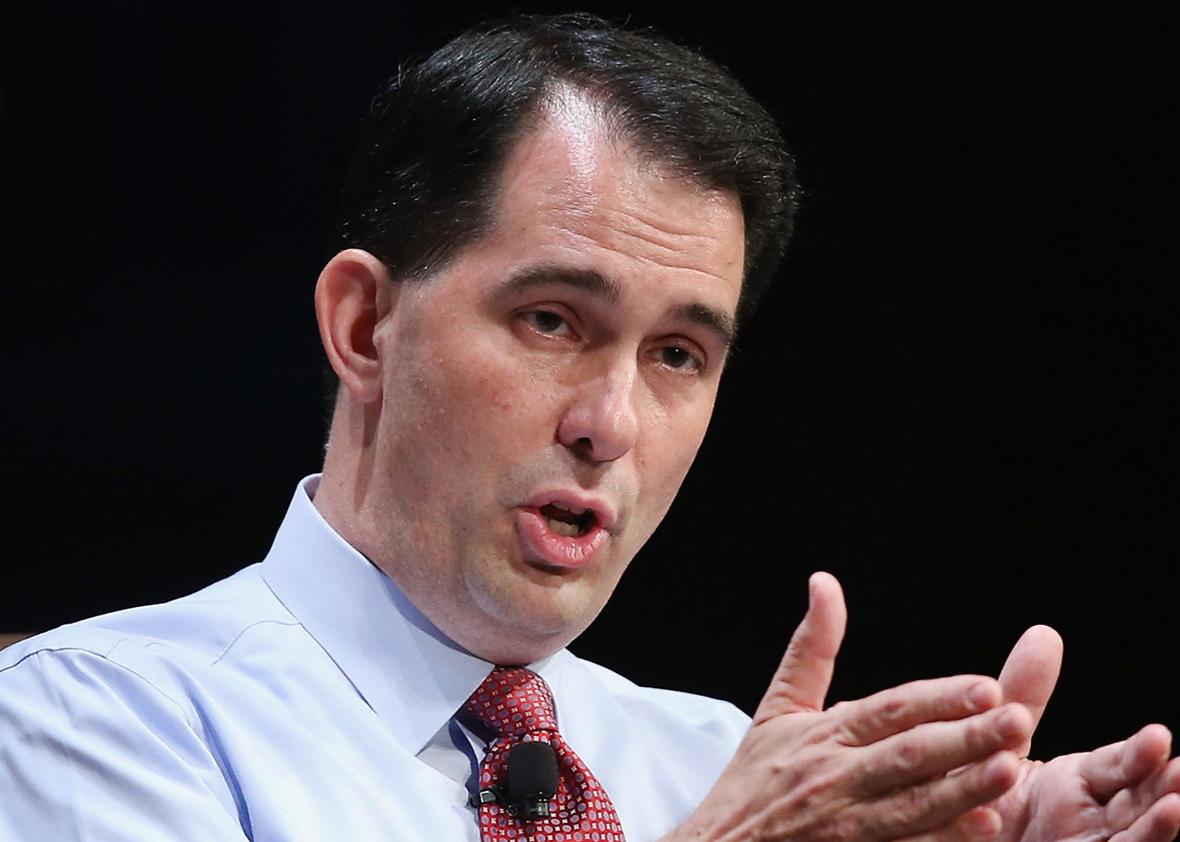On paper, Scott Walker is a winner. He doesn’t just govern a blue state—a win in its own right—he’s transformed it, making Wisconsin a vanguard for conservative causes, from right-to-work laws and public education cuts, to voter ID and strict limits on abortion. He’s done all this with affirmation from Wisconsin voters; he beat a recall attempt in 2012 and won re-election in 2014. Even better, at least for his national ambitions, is his affect. He’s not a firebrand and he doesn’t alienate ordinary Americans. Instead, he looks and sounds like a middle manager; an ordinary, almost boring guy who just wants to save you money.
Walker, put simply, appears tailor-made for a Republican presidential primary—an ideal blend of mainstream experience and conservative politics. But in his months as a presidential candidate, Walker hasn’t been the dark horse we expected—the strongest challenger to Jeb Bush’s dynastic candidacy. He’s been, instead, a non-presence. He doesn’t flicker, let alone catch fire, and when it comes to issues and answering voters, the Wisconsin governor has been awkward, clumsy, and flat-footed. Yes, he has money and yes, he has an organization. But that doesn’t make up for skill, or a lack thereof. So far, he just isn’t good, and it shows.
Take immigration. For all of his nativism and prejudice, Donald Trump has put things in sharp relief, and forced opponents to clarify their beliefs and articulate their stances on the issue. Bush, Marco Rubio, and John Kasich—Walker’s main rivals—have stepped up to the challenge, with conservative positions that still have space to the right, and room to the left, should they get to the general election. Rubio, as we saw during the first Republican presidential debate, won’t take Trump’s anti-immigrant bait. He also consistently backs birthright citizenship, a provision of the 14th Amendment that grants citizenship to anyone born in the United States.
Kasich, likewise, has stuck to his plan: The “11 or 12 million who are here, we ought to find out who they are,” Kasich told CNN. “If they’ve been law-abiding over a period of time, they ought to be legalized, and they ought to be able to stay here.” What’s more, he wants to complete a fence along the U.S.-Mexico border and establish a guest worker program, positions that can be sold to moderates and conservatives.
Bush has been a little muddled—going as far as to defend the term anchor baby—but his policy stance is clear: “There should be a path to earned legal status for those that are here—not amnesty—earned legal status, which means you pay a fine and do many things over an extended period of time,” he said during the Republican debate.
As for Walker? Trump has him shook. On birthright citizenship, the Wisconsin governor has had three different answers. At the Iowa State Fair, he told MSNBC’s Kasie Hunt that he wanted to curb the practice. “To me it’s about enforcing the laws in this country. And I’ve been very clear, I think you enforce the laws, and I think it’s important to send a message that we’re going to enforce the laws, no matter how people come here we’re going to enforce the laws in this country,” he said. The following Friday he told CNBC that he wouldn’t take a stance on the issue. And this past Sunday, he told ABC’s George Stephanopoulos that he doesn’t want to repeal or alter the provision at all. It’s clear, at this point, that he just doesn’t know what to say.
In fairness to Walker, Trump overlaps with his base—working-class and downscale whites. To a large degree, Walker has been shut out by Trump’s rise; with Trump in the race, it’s hard to get a hold with these voters, who prefer the flamboyant reality television star to the staid Midwestern politician.
But even without Trump, it’s not clear that Walker could sail the rocky waters of a presidential campaign. At the GOP debate, for instance, he gave an answer on abortion that—if he’s the nominee—could come back to haunt him. After moderator Megyn Kelly asked if he would “really let a mother die rather than have an abortion,” Walker dodged the question entirely. “I’ve got a position that’s consistent with many Americans out there in that I believe that that is an unborn child that’s in need of protection out there,” he said. “And I’ve said many times that that unborn child can be protected and there are many alternatives that would protect the life of the mother.” That dodge—and the implication, to some ears, that he would let the mother die—is fertile ground for any Democrat who wants to use it.
There’s also the question of Walker’s electoral success. Of his three statewide wins, two were in midterm years, when Republicans have the advantage. Other than the recall race—which took place in the summer of 2012, well before that November’s national elections—he’s never run during a presidential year, when—in the last two cycles—Democrats have had the advantage. His rhetoric aside, he may not be as electable as he looks.
None of this means Walker is doomed. If he improves in debates, learns to answer questions, begins to capitalize on missteps from his opponents, and otherwise boosts his performance, he could soar. The raw material is still there. And he wouldn’t be the first presidential candidate to go from a listless start to a strong and successful finish.
But right now Walker looks like he’s on the wane. He’s not quite Tim Pawlenty—the doomed Minnesota governor who quit the 2012 Republican primary after poor showings in polls and onstage—but he’s coming uncomfortably close.
